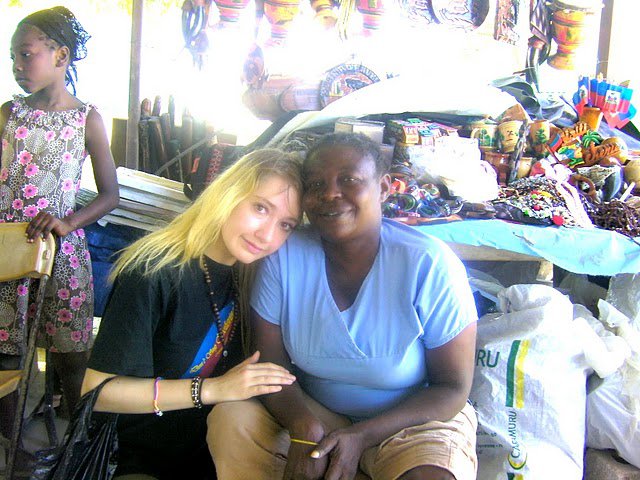Voluntourism is the savior complex at work
September 28, 2022
I remember the day I set foot in the tiny Port Au Prince airport in Haiti in 2011, the shouting men eager to help with my bags in exchange for money and the moving truck my companions and I piled into the back of as we drove along a dusty and bumpy road to the Mission of Hope Haiti compound.
Though I traveled there with a Christian church, I remember wondering how god could be real when driving by so many people living in collapsing tarp-structures off the main roads of Port Au Prince.
As I came to meet Haitian people and converse with them in the minimal Haitian Creole I learned from Google translate, I saw what vibrant and welcoming spirits they possessed, how they worshiped with song and dance in a way that American worship seemed to lack.
A term I didn’t become acquainted with until years later was “voluntourism,” a combination of volunteering while also touring a foreign country, often through a charity organization that accepts money from participants who stay in their compounds or in hotels as was an option for us.
These trips have long appealed to Westerners with a philanthropic tendency, enticing them with the opportunity to help people who appear less fortunate while also gaining valuable life experience.
The daunting question is, who are these missions really helping?
Instead of hiring contractors and local businesses to build houses, schools or clinics, these mission organizations often bring inexperienced, unqualified people to build and paint structures for native families.
The result? Poorly executed work that may need to be redone by the people that were supposed to receive help, according to an anonymous source interviewed by Vice who worked in voluntourism for a decade.
Furthermore, bringing marketplaces and free labor into these countries can destabilize local economies by creating competition for businesses and contractors who actually live and work there full time. It can create a dependency on foreign aid, according to The Michigan Journal of Economics.
Primarily white populations flock to these trips, which cost thousands of dollars for 1-2 weeks of painting, building and visiting orphanages.
The unseen problem with these orphanages is that children are often entirely undocumented and can easily fall victim to trafficking, according to Vice’s source.
According to Tina Rosenburg at The Guardian, “Save the Children looked at orphanages in Sri Lanka in 2005 and found that 92% of children had a living parent. A 2006 survey by Unicef in Liberia found that 98% of children living in orphanages were not orphans.”
There is incentive to keep the orphanages full so that voluntourists have children to take pictures with, even though children would likely function better if they had a home and family.
That’s not to say that people on mission trips don’t genuinely connect with those they meet. I connected with so many beautiful, lively Haitian children and women. I played soccer with them and they braided my hair and I’ll never forget those moments.
However, the idea that I could offer anything helpful to these children, especially through an organization so rooted in religion, was misguided.
Haiti is predominantly Catholic with a large population practicing traditional voodoo. I got the sense that the people at the organization I stayed with were not supportive of the voodoo traditions and hoped Haitians would practice Catholicism instead.
The people I traveled with were all white Christians, the majority of the people at the compound were as well. Now as an adult, there’s something that doesn’t sit right with me when white people go to a country with people of a different race and background and try to impress their Christian morals on them or help them steer clear of “sins.” It screams new wave colonialism.
This can be referred to as a “savior” complex: the desire to save others and the need to be in a role that fixes their problems. More specifically, this could be viewed as propagating a “white savior” complex, where white people feel they need to save poor, darker-skinned people from poverty, according to BlackEqualityResources.com.
When unqualified people try to help, it often results in a cosmetic approach that can create more problems than it solves.
I was a naive 16-year-old when I went on this trip, but my own lack of research was not an anomaly. It seemed that most people I traveled with had not studied the language and did not have educational backgrounds in building communities in Haiti or anywhere else.
I encourage anybody who considers embarking on a mission trip to ask themselves: Am I qualified to help in the ways I want to? Do I know how this organization spends their money, are they transparent about it? Why do I want to serve others? How can I be as knowledgeable as possible about the effect my actions have on others, both short and long-term?
You may find that you have more work to do before you can claim to be helpful.
For those who are qualified, there are people hurting right here in America in areas like Skid Row. I encourage you to look into how you can help your own neighbors before traveling across the world to feel useful. If you want the tourist experience, support local vendors instead of organizations selling false images.
https://www.worldvision.ca/stories/voluntourism-the-good-and-the-bad
Vice interview: https://www.youtube.com/watch?v=KL8CIZej19o&ab_channel=VICE
https://blackequalityresources.com/white-savior-complex/


